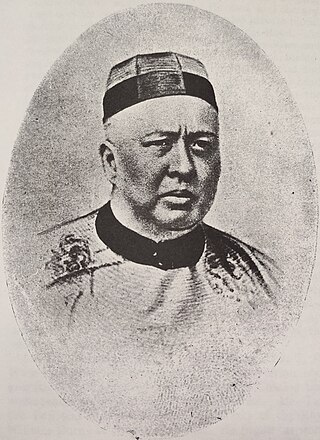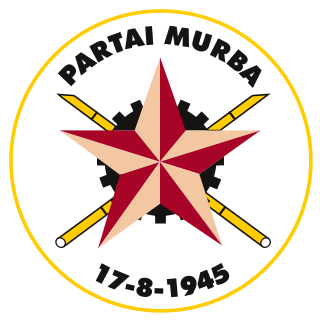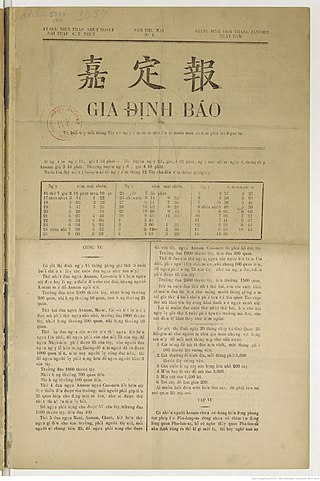Related Research Articles

Kenneth Pomeranz, FBA is University Professor of History at the University of Chicago. He received his B.A. from Cornell University in 1980, where he was a Telluride Scholar, and his Ph.D. from Yale University in 1988, where he was a student of Jonathan Spence. He then taught at the University of California, Irvine, for more than 20 years. He was elected a Fellow of the American Academy of Arts & Sciences in 2006. In 2013–2014 he was the president of the American Historical Association.

The Hock Lee bus riots took place on 24 April 1955 in Singapore. The riots started as a result of confrontation between the police, bus workers of the Hock Lee Amalgamated Bus Company and students who supported the bus workers.

Seah Eu Chin was an immigrant from South China to Singapore, later becoming a successful merchant, a prominent descendant of Seah Clan and leader in the Overseas Chinese community.

The establishment of a British trading post in Singapore in 1819 by Sir Stamford Raffles led to its founding as a British colony in 1824. This event has generally been understood to mark the founding of colonial Singapore, a break from its status as a port in ancient times during the Srivijaya and Majapahit eras, and later, as part of the Sultanate of Malacca and the Johor Sultanate.

Oei Tiong Ham, Majoor-titulair der Chinezen was a Chinese Indonesian tycoon and the son of Oei Tjie Sien, the founder of the Kian Gwan, a multinational trading company. Born in Semarang, Central Java, Dutch East Indies, he became the wealthiest person in Asia at the start of the twentieth century. Part of his wealth originated in his involvement in the sugar industry. He served as Luitenant der Chinezen in the Dutch colonial administration in Semarang, and was raised to the rank of titular Majoor upon retirement.

The early history of Singapore refers to its pre-colonial era before 1819, when the British East India Company led by Stamford Raffles established a trading settlement on the island and set in motion the history of modern Singapore.

Tan Kim Ching, also known as Tan Kim Cheng, was a Chinese politician and businessman. He was the eldest of the three sons of Tan Tock Seng, the founder and financier of Tan Tock Seng Hospital. He was consul for Japan, Thailand and Russia, and was a member of the Royal Court of Siam. He was one of Singapore's leading Chinese merchants and was one of its richest men in Singapore at that time. He was also the first Asian member of the Straits Branch of the Royal Asiatic Society. After his father's death, he became the Kapitan Cina of the Straits Chinese community. He is believed to have been the head of the Triad in Malaya.

The Bowring Treaty was a treaty signed between the British Empire and the Kingdom of Siam on 18 April 1855. The treaty had the primary effect of liberalizing foreign trade in Siam, and was signed by five Siamese plenipotentiaries and Sir John Bowring, the British envoy and colonial governor of Hong Kong.

The Kangchu system was a socio-economic system of organisation and administration developed by Chinese agricultural settlers in Johor during the 19th century. The settlers organised themselves into informal associations, and chose a leader from among themselves.

Wee Bin born in China in 1823, was a Chinese migrant of the mid-nineteenth century who founded what was, at the time, Singapore's largest Chinese shipping firm.
Kiong Kong Tuan was a Chinese merchant from Penang. He was a merchant in Penang before establishing himself in Singapore. Kiong Kong Tuan held the revenue farms for opium in the 1830s, and also for spirits. He had a spirit factory at Pearl's Hill, and the site was known among the Chinese as Chiu-long-san. He was known to have held the opium and spirit farms in 1848, and was the last opium farmer in Singapore. He was also involved in coffee and real estate. In the 1840s he had 50 acres (200,000 m2) of coffee planted near Jurong. Kiong was the grantee of a large, 20 acres (81,000 m2) tract of land, with Chin Swee Road as the main artery and Cornwall Street and Seok Wee Road as side streets, which was a densely-populated Straits Chinese residential quarter.
Choa Chong Long was a Chinese prominent magnate, revenue farmer and pioneering colonist who served as the first Kapitan Cina of Singapore under the British colonial government.

Murba Party was a 'national communist' political party in Indonesia. The party was founded by Tan Malaka, Chairul Saleh, Sukarni and Adam Malik in 1948. The history of the party was largely intertwined with that of the powerful Communist Party of Indonesia (PKI). Initially relations between PKI and the Murba Party were fluid, but gradually the two parties developed into each other's arch-enemies. The Murba Party continued to exist under the New Order, but was merged into the Indonesian Democratic Party in 1973.
The Singapore Federation of Trade Unions was a trade union centre in Singapore. It was founded in October 1945 as the Singapore General Labour Union on the initiative of the Malayan Communist Party. SGLU was the first unit of the Malayan General Labour Union, which expanded throughout Malaya. SGLU was reconstituted as SFTU in August 1946, as the Malayan General Labour Union was divided into the SFTU and the Pan-Malayan Federation of Trade Unions.
Jardine, Skinner and Company was a trading company based in Calcutta, India. It was founded in 1825, initially dealing in textiles. Later it branched out into opium, tea, timber and petroleum. The company was closely associated with Matheson & Company of London and Jardine Matheson & Co. of Hong Kong.
Chandu is a rare concentrated preparation of opium which can be smoked. It is made by straining and boiling raw opium. Chandu was prepared for smoking in opium pipes in Asian regions, specifically China and India, in opium dens. The Chandu form of opium delivers the purest euphoric and strongest rush of opium. The dealers of Chandu used to adulterate it with the left-over ash which was morphine adding more numbing effect, although it is the morphine content in the opium which elevates pain relief and numbing properties. Chandu is usually vaporized in pipes where it is subjected to heat of a flame, leaving no residue.
This page includes books about Singapore.
The Singapore Council of Women (SCW) was an organization based in Singapore. The group advocated for women's rights and was especially vocal on issues relating to women and marriage. The SCW also made sure it had a good relationship with the media, and wrote often to newspapers about women's issues. SCW lectured on women's rights in various neighborhoods in Singapore. The advocacy efforts of SCW helped speed the passage of the Women's Charter.

The economy of the nineteenth-century period of the Nguyễn dynasty was primarily agricultural. Ninety-five percent of the national economy depended on agriculture. Fragile Mining and handicraft were the only industry sectors in the country before the 1870s. International trade and business were heavily restricted by the Confucian-minded bureaucratic state. Contact with the outside world and modernisation efforts were kept constraining.

Opium was first recorded in Singapore by a written document that record Stamford Raffles gifting opium to a local ruler in 1819 to establish Singapore. Opium then became accessible through trading and the opium farms in Singapore in the 19th century. It is one of the most traded good along the Sea Trade route after the end of the Opium Wars. With the rise of opium farms in Singapore, they acted as the middleman that help to process raw opium imported from British India, Persia, and Turkey to consumable opium and retail them to the Chinese coolies in local. In 1946, opium, including the tools, and opium dens are completely banned in Singapore. To treat the opium addicts, an Opium Treatment Centre was opened in 1955 and in 1989, the Singapore government extends the death penalty for opium traffickers.
References
- ↑ Carl Trocki's profile Archived 8 May 2014 at the Wayback Machine at the Ohio University database
- ↑ "QUT Search - results for 'trocki'". searching.qut.edu.au. Retrieved 11 January 2017.
- ↑ Trocki, C. (2012). Opium, Empire and the Global Political Economy: A Study of the Asian Opium Trade 1750-1950. Taylor & Francis. ISBN 9781135118990 . Retrieved 11 January 2017.
- ↑ Barr, M.D.; Trocki, C.A. (2008). Paths Not Taken: Political Pluralism in Post-war Singapore. SINGAPORE University Press. ISBN 9789971693787 . Retrieved 11 January 2017.
- ↑ Cooke, N.; Li, T. (2004). Water Frontier: Commerce and the Chinese in the Lower Mekong Region, 1750-1880. Singapore University Press. p. 202. ISBN 9780742530836 . Retrieved 11 January 2017.